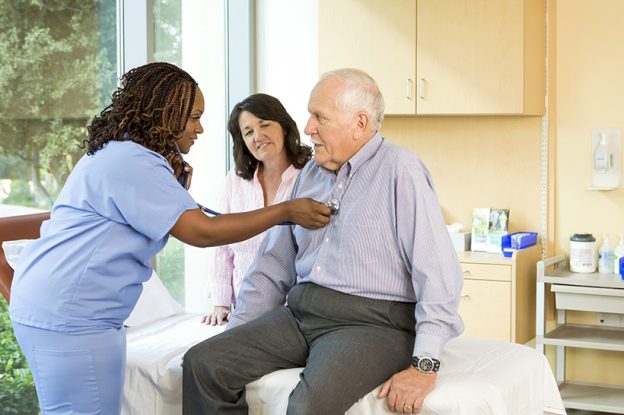
Residents lead advances in understanding of “broken heart” syndrome
Research led by internal medicine residents at the Kaiser Permanente Los Angeles Medical Center has surfaced new insights into Takotsubo syndrome, a condition that closely resembles a heart attack. Most importantly, the findings link beta-blocker treatment with improved clinical outcomes.
This project began in 2019, when residents Christopher Lau, MD, Sarah Chiu, MD, and Rohith Nayak, MD, discussed the possibility of conducting cardiology research with Mingsum Lee, MD, PhD, a cardiologist at the Kaiser Permanente Los Angeles Medical Center and a clinician investigator for the Department of Research & Evaluation.
With Dr. Lee’s guidance, the residents chose to undertake a comprehensive analysis of Kaiser Permanente’s detailed dataset on people with Takotsubo syndrome.
Also known as “broken heart” syndrome, Takotsubo syndrome occurs when severe emotional or physical stress weakens the heart muscle. Patients typically come to the hospital with symptoms resembling a heart attack, but Takotsubo syndrome is distinguished by a unique ballooning in a particular part of the heart.
No standard approaches have been established for managing this specific condition.
“Now, despite their heavy clinical workload, this team of residents has made new discoveries that advance the field and could help improve patient care,” Dr. Lee said. “Their success was possible because of how well they worked together and managed their time.”
The project has already resulted in 2 published papers, and more are in preparation for submission.
Identifying factors linked to better outcomes
The team’s first paper appeared in the journal Heart on January 8, with Dr. Lau as first author. In this study, the researchers examined factors that may be associated with better or worse outcomes of Takotsubo syndrome. To do so, they analyzed the medical records of 519 people who had a confirmed diagnosis of Takotsubo syndrome between 2006 and 2016.
The analysis showed that people with Takotsubo syndrome who were treated with medications known as beta blockers had higher survival rates and lower rates of recurrence of the condition.
“Further research is needed in this area, but our findings make an interesting case for beta blockers as a potential therapy to help protect patients from experiencing Takotsubo syndrome a second or third time.” Dr. Nayak said.
On January 13, the team’s second paper appeared in the Canadian Journal of Cardiology. Led by Dr. Chiu and using the same dataset, this study drew comparisons between Takotsubo syndrome and heart attacks. It showed that 2% of patients who presented with heart attack symptoms had Takotsubo syndrome, and these patients were more likely to be women, older, and white.
The researchers also found that people with Takotsubo syndrome had better outcomes, such as lower risk of death, compared to people who experienced heart attacks due to coronary artery disease.
“It is also very interesting that patients who are emotionally stressed can have symptoms of an actual heart attack,” Dr. Chiu said. “Hopefully this emphasizes the need for better mental health services, which could help patients recuperate smoothly and even prevent others from experiencing this condition.”
A resilient collaboration
The residents said that working within the Kaiser Permanente system was a huge advantage for this project because it allowed them to easily compile data for a large, diverse cohort of patients.
“Especially in Southern California where we have patients from various racial and ethnic backgrounds, our findings potentially make a significant contribution to the existing research because the largest prior studies on stress cardiomyopathy were mainly on white or European patients,” Dr. Chiu said.
The researchers also hope that their success could inspire other residents to pursue research.
“Collaborating with other residents makes the research process more fun and productive,” Dr. Nayak said. “Finding a great mentor who can guide you through the various steps in the research process is essential, especially if you have limited research experience.”
The team’s collaborative approach, as well as support from the Department of Research & Evaluation, allowed them to stick with the project despite a particularly heavy clinical schedule during the COVID-19 pandemic.
“Being a resident is already pretty challenging without COVID-19, but they managed to complete their research alongside their increased clinical responsibilities,” Dr. Lee said. “I am so proud of them.”





